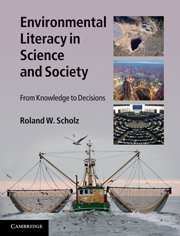Crossref Citations
This Book has been
cited by the following publications. This list is generated based on data provided by Crossref.
Villamor, Grace B.
van Noordwijk, Meine
Le, Quang Bao
Lusiana, Betha
Matthews, Robin
and
Vlek, Paul L.G.
2011.
Diversity deficits in modelled landscape mosaics.
Ecological Informatics,
Vol. 6,
Issue. 1,
p.
73.
Schmidt, Jan C.
2011.
What is a problem?.
Poiesis & Praxis,
Vol. 7,
Issue. 4,
p.
249.
Schoot Uiterkamp, Anton J.M.
2011.
A perspective on programmes in higher environmental education.
Greenhouse Gas Measurement and Management,
Vol. 1,
Issue. 3-4,
p.
142.
Girod, Bastien
de Haan, Peter
and
Scholz, Roland W.
2011.
Consumption-as-usual instead of ceteris paribus assumption for demand.
The International Journal of Life Cycle Assessment,
Vol. 16,
Issue. 1,
p.
3.
Stauffacher, Michael
2011.
Handbuch Umweltsoziologie.
p.
259.
Shiroyama, Hideaki
Yarime, Masaru
Matsuo, Makiko
Schroeder, Heike
Scholz, Roland
and
Ulrich, Andrea E.
2012.
Governance for sustainability: knowledge integration and multi-actor dimensions in risk management.
Sustainability Science,
Vol. 7,
Issue. S1,
p.
45.
Hansmann, Ralph
Mieg, Harald A.
and
Frischknecht, Peter
2012.
Principal sustainability components: empirical analysis of synergies between the three pillars of sustainability.
International Journal of Sustainable Development & World Ecology,
Vol. 19,
Issue. 5,
p.
451.
Bügl, Robert
Stauffacher, Michael
Kriese, Ulrich
Pollheimer, Daniel Lehmann
and
Scholz, Roland W.
2012.
Identifying Stakeholders' Views on Sustainable Urban Transition: Desirability, Utility and Probability Assessments of Scenarios.
European Planning Studies,
Vol. 20,
Issue. 10,
p.
1667.
Schlegel, Matthias
Trutnevyte, Evelina
and
Scholz, Roland W.
2012.
Patterns of residential heat demand in rural Switzerland.
Building Research & Information,
Vol. 40,
Issue. 2,
p.
140.
Wiek, Arnim
Ness, Barry
Schweizer-Ries, Petra
Brand, Fridolin S.
and
Farioli, Francesca
2012.
From complex systems analysis to transformational change: a comparative appraisal of sustainability science projects.
Sustainability Science,
Vol. 7,
Issue. S1,
p.
5.
Lang, Daniel J.
Wiek, Arnim
Bergmann, Matthias
Stauffacher, Michael
Martens, Pim
Moll, Peter
Swilling, Mark
and
Thomas, Christopher J.
2012.
Transdisciplinary research in sustainability science: practice, principles, and challenges.
Sustainability Science,
Vol. 7,
Issue. S1,
p.
25.
HAYASHI, Kiyotada
2012.
Multiple Criteria-Multiple Participant Decisions for Establishing Sustainable Society Based on Biomass Utilization.
Journal of Life Cycle Assessment, Japan,
Vol. 8,
Issue. 4,
p.
349.
Kirchhoff, Thomas
Brand, Fridolin S.
and
Hoheisel, Deborah
2012.
Resilience and the Cultural Landscape.
p.
49.
Schneidewind, Uwe
2012.
Nachhaltigkeit.
p.
67.
Kriese, Ulrich
and
Scholz, Roland W.
2012.
Lifestyle Ideas of House Builders and Housing Investors.
Housing, Theory and Society,
Vol. 29,
Issue. 3,
p.
288.
Stauffacher, Michael
Krütli, Pius
Flüeler, Thomas
and
Scholz, Roland W.
2012.
Tackling Long-Term Global Energy Problems.
Vol. 52,
Issue. ,
p.
227.
Trutnevyte, Evelina
Stauffacher, Michael
Schlegel, Matthias
and
Scholz, Roland W.
2012.
Context-Specific Energy Strategies: Coupling Energy System Visions with Feasible Implementation Scenarios.
Environmental Science & Technology,
Vol. 46,
Issue. 17,
p.
9240.
Schneidewind, Uwe
Augenstein, Karoline
and
Scheck, Hanna
2013.
Transition to Renewable Energy Systems.
p.
119.
Seidl, Roman
Brand, Fridolin Simon
Stauffacher, Michael
Krütli, Pius
Le, Quang Bao
Spörri, Andy
Meylan, Grégoire
Moser, Corinne
González, Monica Berger
and
Scholz, Roland Werner
2013.
Science with Society in the Anthropocene.
AMBIO,
Vol. 42,
Issue. 1,
p.
5.
in ’t Veld, Roeland Jaap
2013.
Transgovernance.
p.
3.





